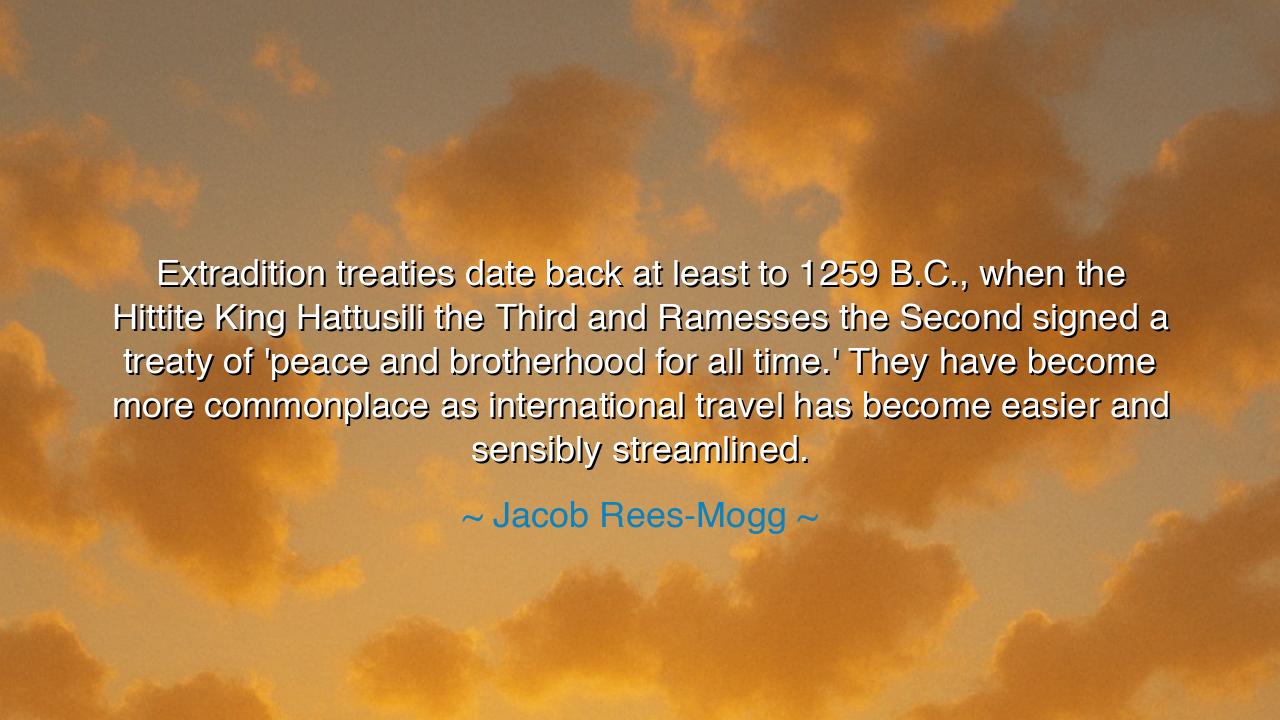
Extradition treaties date back at least to 1259 B.C., when the
Extradition treaties date back at least to 1259 B.C., when the Hittite King Hattusili the Third and Ramesses the Second signed a treaty of 'peace and brotherhood for all time.' They have become more commonplace as international travel has become easier and sensibly streamlined.






Jacob Rees-Mogg reminds us of a profound truth when he says: “Extradition treaties date back at least to 1259 B.C., when the Hittite King Hattusili the Third and Ramesses the Second signed a treaty of ‘peace and brotherhood for all time.’ They have become more commonplace as international travel has become easier and sensibly streamlined.” At first this sounds like the sober record of history, yet within it resounds the eternal heartbeat of civilization. For it speaks of mankind’s ceaseless attempt to rise above chaos, to bind nations not only with the sword but with the pen, and to create law where once there was only vengeance.
The ancients understood that without agreements, every border was a place of war, every fugitive a cause for conflict. Thus, when Hattusili III and Ramesses II—two kings once locked in bitter battle at Kadesh—chose instead to sign a covenant of brotherhood, they carved a new path for humanity. Their treaty was not merely about extradition or the return of those who fled across lands; it was about trust, about the recognition that no kingdom can stand alone, that peace must be woven through bonds of mutual duty. Their words, inscribed upon tablets, still speak today of humanity’s attempt to reach toward order in a world of strife.
History gives us many examples of the same impulse. In the Middle Ages, princes and kings would send emissaries to negotiate the fate of criminals, rebels, or outlaws who sought shelter across borders. Such negotiations were not only about law—they were about honor. To honor a treaty was to show strength; to betray it was to invite endless discord. Even in the modern age, as Rees-Mogg reminds us, the ease of travel has made these treaties ever more necessary. The swiftness with which a man may flee today, by sea or sky, demands that nations cooperate lest justice dissolve in the cracks between borders.
But his words carry a deeper meaning still: that peace and justice must be built deliberately. They do not arise by chance, nor do they endure by neglect. Just as the ancients chiseled their treaties into stone, so must we carve our agreements into the living fabric of society. For without shared laws, there can be no trust; and without trust, there can be no brotherhood between peoples. Treaties, then, are not dry relics of diplomacy—they are living covenants, signs of humanity’s striving toward unity.
Consider also the story of the Peace of Westphalia in 1648, which ended the Thirty Years’ War in Europe. That agreement was born out of exhaustion, yet it laid down principles of sovereignty and cooperation that echo into our age. It shows us the same truth as the ancient kings knew: that treaties are the bones upon which the flesh of civilization rests. They transform chaos into order, rivalry into structured competition, suspicion into cautious peace.
The lesson here is luminous: seek peace through bonds, not isolation. In our lives as in our nations, we cannot exist as islands. We must make covenants—between friends, families, communities, and countries—that bind us to higher principles. To do this requires humility, for to sign a treaty is to admit that one cannot rule alone. It requires foresight, for no one knows when they may depend upon the honor of another to uphold their word.
Practically, this means we should live as those who value agreements and promises. Guard your word, for treaties, whether between kings or between ordinary men, are built upon trust. Keep faith even when it costs you. Build bridges where walls seem easier. And remember always the wisdom of the ancients: that even after battle, brotherhood can be forged, and that law shared between peoples is stronger than law imposed by the sword.
Thus, Rees-Mogg’s words echo not only as history but as teaching: that from the stone tablets of the Hittites to the agreements of our age, humanity’s greatness lies in its ability to build peace through covenant. And if ancient kings could turn from war to brotherhood, then so too can we in our daily lives—choosing order over chaos, fidelity over betrayal, and cooperation over strife. For treaties, whether written in stone or in the heart, are the anchors of civilization.






AAdministratorAdministrator
Welcome, honored guests. Please leave a comment, we will respond soon